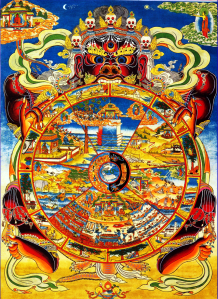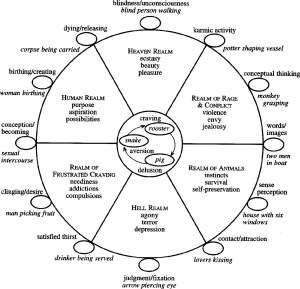The problem with success is, it never ends.
We talk a lot about success even when we don’t use the word. Who has the best job. The biggest house. The handsomest lover. I’d make a poetic list but you get the idea. As humans we waste most of our time chasing after success, in one form or another. Who has the most? How did they get it? And how do we get our own?
That fearsome beauty is the buddhist Wheel of Life. With its demons, ghosts and gods It may look supernatural, but in fact it is all about the real world that we live in. It illustrates what buddhists call Samsara, the cycle of material existence. If it looks familiar, that’s because Samsara is what we in Western christian culture call heaven and hell. But in buddhist culture heaven and hell aren’t somewhere else. We make them here on earth, as part of the cycle of Samsara.
It’s a cycle because the Wheel of Life never stops turning. Buddhists divide Samsara in to six realms, the lowest are pretty hellish and the highest are rather heavenly. Living creatures struggle to progress around the wheel so they can escape hell and live in heaven. But the cycle is an illusion. Once living creatures have rested in heaven a while, they are sent back to hell, to begin the cycle again.
At the heart of the Wheel of Life are a pig, a snake and a rooster. Imagine a hamster wheel, but instead of a hamster you have these three animals, and they are always chasing one another, so driving the Wheel of Life forever. Remember Tom and Jerry and their bulldog pal Spike from the Warner Bros cartoons? These animals are a lot like that.

Of course the world isn’t literally turned by a pig, snake and rooster. These are symbols for three basic human behaviours. Craving, aversion and delusion. I prefer to call them greed, hate and delusion. Those are better translations for Western minds. We act out these behaviours all the time. When we see cake we get greedy for more. We hate the cold and try to escape it. And we fall easily in to delusions, like obsessing about how our hair looks. Who cares? We do, because we’re deluded.
“If you can dream—and not make dreams your master;
If you can think—and not make thoughts your aim;
If you can meet with Triumph and Disaster
And treat those two impostors just the same”If by Rudyard Kipling
So this is success. It’s acting in greedy, hateful and deluded ways to get the top job, the big house, and lots of people pretending to be your friend so they can get at what you have. It’s being the King, the Boss, the Star. And it’s the illusory belief that these things will last when they won’t, and that they are better than the alternative when they aren’t. Take a look at the world around you. How many people are on the treadmill, running the rat race, climbing the ladder, and walking the eternal cycle of Samsara? How often do you find yourself making the greedy, hateful or deluded choice to get ahead?
That’s most of us, most of the time.
Siddhartha Gautama – an Indian prince who gave up the family trade to become a bum, then later taught some cool ideas about being free and living well – suggests an alternative. Instead of acting with greed, act with generosity. Instead of acting with hatred, act with kindness. And instead of being deluded, try and see the truth. Your haircut doesn’t matter. It truly doesn’t.
Buddhism calls this being skillful. because it’s hard, and requires skill. Greed is your trained response, so to be generous you have to catch yourself in the moment, and choose to share that chocolate with your friend instead of snarfing it all down your gullet. That’s hard, and even the most skillful people fail at it all the time. We’re only human, after all.
Rudyard Kipling finishes the poem If with the two lines: “Yours is the Earth and everything that’s in it, And—which is more—you’ll be a Man, my son.” Kipling and Buddha both have the same message. If you can skilfully control your behaviour, you’ll be a man. Which is to say, a human.
The real measure of success isn’t your place on the Wheel of Life. It’s the quality of you’re humanity. So you’re the CEO of a Fortune 500 company. Fine. But when you make that $10M bonus do you hoard it away, or give it away? A skilful person can pursue worldly success, it’s a fun thing to do. But they won’t do it at the cost of of their humanity. It’s our skilfulness that makes us human. And it’s being human that is the greatest success.


You’re conflating Kipling’s idea of machismo with being a better human. He meant Man, as in the male of the species, not women. Although buddhism is also sexist and thus flawed. Don’t mistake me, IDEAS about sharing, generosity are great. Systems/religions not so much.
LikeLike
I’m not really writing about Kipling. Or indeed buddhism. Why recast it as that in your comment?
LikeLike
“..when you make that $10M bonus do you hoard it away, or give it away?” Wish I could say that the rich I know gave it away. But no. They “trickle” it down, buying more, insulating themselves from reality with bigger ‘palaces,’ fancier cars, spinning up into rage when any of their goodies are flawed.
There are some who get it and gallantly “suffer” through their wealth, while using it for the common good.
Meanwhile the 1% just snagged nearly 20% of America’s money and resources (including Senators! & our Supreme Court! SOAB!!!)
Think about that. In a room of 100 people, one person walks up to the table and claims 1/5 of everything there, whether they can eat it or not. Welcome to the new “landed so called gentry.”
Which is why the starving rabble of France screamed “Guillotine!” to Miss “let them eat cake.”
LikeLike
I partially agree. I believe that it’s very important to control (or work on controlling, it’s hard) how you define success, and base that largely on things you can control (I got this from a modified version of the stoics). Thus, success is about working hard and producing something you’re proud of, rather than the accolades you get (or don’t).
I think there’s a little lack of clarity here between success, quality, and humanity. For me at least, defining success within the context of that which I can control leads to greater tranquility, but this is separate from my humanity (which I have by default) or the quality of it, which is very subjective: I’m not willing to say that someone isn’t as high a quality human being if they don’t give away enough of their riches for me – I’m not willing to apply those kinds of universals to my subjective opinions. Sure, I’ll judge them, I just won’t make those kind of blanket statements (i.e. “that guy is sort of a miserly prick” as opposed to “that guy is a low quality human being.”). YMMV – like I said, it’s subjective.
LikeLike
Pigs, roosters, and snakes. They may not actually run the world but they certainly own a controlling share of most internet comment boards.
It’s a good essay. I enjoyed it. Although, if heaven and hell are states of being, I would have to cast success as knowing when to run and when to mosey. In the end it could be all about pacing.
LikeLike
You gotta know when hold ‘em and when to fold ‘em?
LikeLike
Many traditions share this basic truth: you are not your success or your failure. It is my relationship to these external impressions that is important. For example, Krishna tells Arguna to be, “Self-possessed, resolute, act without any thought of results, open to success or failure.” Christ said, “For what shall it profit a man, if he shall gain the whole world, and lose his own soul?”
The trick is, of course to learn how not to be identified with the success.
LikeLike